U.S. halts cattle imports from Mexico, citing fears of flesh-eating maggot
Concerns over a flesh-eating parasite have led U.S. officials to halt all imports of live cattle, horses and bison across the Southern border.
Agriculture Secretary Brooke Rollins made the decision on Sunday, citing the northward spread of the New World screwworm, which has been detected in southern Mexico in the last year.
“The protection of our animals and safety of our nation’s food supply is a national security issue of the utmost importance,” Rollins said in a statement.
“This is not about politics or punishment of Mexico, rather it is about food and animal safety,” she said.
New World screwworms are fly larvae that burrow into a wound or mucous membranes of animals and rarely humans.
The maggots feast on the flesh and blood of their host with tiny mouth hooks. Left untreated, the parasitic infection can kill a full-grown cow within one to two weeks.
Efforts to get rid of the pest go back many decades.
In fact, the U.S and Mexico were able to eradicate the New World screwworm in the 1960s and ’70s by releasing hundreds of millions of sterile adult flies that would mate with the females — ultimately preventing them from laying viable eggs.
This strategy helped create a “barrier zone” that kept the pest from encroaching into the U.S. and Mexico, though cases would still pop up from time to time.
In 1976, an outbreak in Texas affected more than 1.4 million cattle and hundreds of thousands of sheep and goats. If such an outbreak were to occur now, it’s estimated that would cost the Texas economy $1.8 billion, according to a USDA analysis.
The potential fallout is why agricultural officials are so alarmed that the pest has made a comeback in the last few years.
Cases have surged in parts of Central America and are now being detected in some “remote farms” in Mexico about 700 miles from the U.S border, the USDA said on Sunday.
As a result, the U.S. shut down live animal trade on the border in November. That was lifted in February after the U.S and Mexico agreed on new measures to keep the parasite at bay.
The new ban will continue on a “month-by-month basis, until a significant window of containment is achieved,” according to the USDA.
‘Dawson’s Creek’ star James Van Der Beek has died at 48
Van Der Beek played Dawson Leery on the hit show Dawson's Creek. He announced his colon cancer diagnosis in 2024.
A Jan. 6 rioter pardoned by Trump was convicted of sexually abusing children
A handyman from Florida who received a pardon from President Trump for storming the U.S. Capitol on Jan. 6, 2021, was convicted on state charges of child sex abuse and exposing himself to a child.
A country-pop newcomer’s debut is your reinvention album of 2026
August Ponthier's Everywhere Isn't Texas is as much a fully realized introduction as a complete revival. Its an existential debut that asks: How, exactly, does the artist fit in here?
U.S. unexpectedly adds 130,000 jobs in January after a weak 2025
U.S. employers added 130,000 jobs in January as the unemployment rate dipped to 4.3% from 4.4% in December. Annual revisions show that job growth last year was far weaker than initially reported.
Greetings from Mexico City’s iconic boulevard, where a dog on a bike steals the show
Every week, more than 100,000 people ride bikes, skates and rollerblades past some of the best-known parts of Mexico's capital. And sometimes their dogs join them too.
February may be short on days — but it boasts a long list of new books
The shortest month of the year is packed with highly anticipated new releases, including books from Michael Pollan, Tayari Jones and the late Nobel laureate Mario Vargas Llosa.






